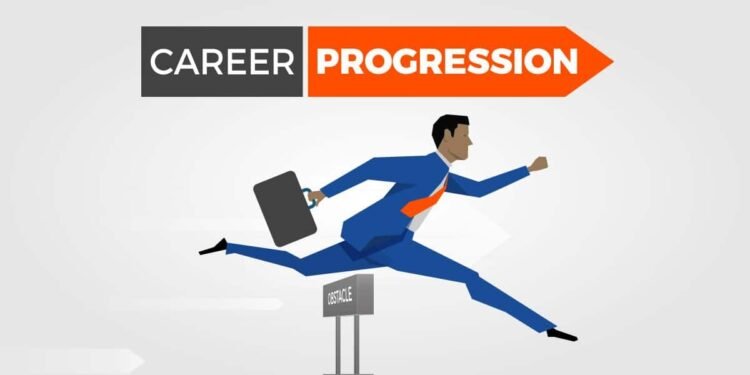For some companies, career progression is a crucial part of their human capital strategy to achieve growth but the ball is, however, in your court as to how far vertically and horizontally you want to go in your own career journey. It’s yours to own.
Some of these organizations have defined paths already mapped out for you even before your interview for the role. That’s the ideal situation but even with the ideal situation, it’s still largely your choice as to how your career progression unfolds.
For the purpose of this text, I will focus on the not-so-ideal and no-ideal situation as it is with many Nigerian organizations although many Nigerian firms are jumping on the train of commitment to long-term employee development. Thanks to initiatives like the Jobberman Best 100 Companies to Work For in Nigeria, more companies are embracing the culture of employee development and career progression.
To get to the top, you have to make some changes and create your own progression plan. Below is a guide to creating a 7-point personal career progression plan:
1. Study Successful People and Learn
This is so simple, you have probably taken it for granted without even realising it. Once, I was in an interview for an internal role I considered the next step in my career progression within the organization. Incidentally, I competed with my fellow colleagues and friends for the role and I tried my best but I didn’t get the role. I could have stayed disappointed but I took it upon myself to go ahead and analyze why I didn’t get the role. I studied my colleague who got the role to see what advantages she had over me. A few weeks after, I also went a step further to get feedback from one of the top management staff who sat on the interview panel. I eventually discovered that her additional degree served as a leverage for her so I picked up on procrastinating to start my own degree. I told myself I would never miss a chance like that again. It was a promise I made to myself.
2. Research on Industry Practice
One of my favourite pastimes is hanging out on social media as with all other millennials. Sometimes, it can be way more than a pastime and can easily become quite addictive but I use this same culture to stay current on developments in my industry. I use professional platforms like LinkedIn and Medium to monitor the trends in my industry by studying (the people) industry decision makers and players. You can get access to my free video course on searching and connecting with other professionals in your industry.
This helps me to understand where my industry is headed and how to position myself with industry influencers.
3. Document Your Successes
A major part of creating your progression plan is by documenting the successes you have made in the past. Most times, the roles ahead of you would require not just potential that you can take on the responsibility but evidence that you have indeed achieved success in this before even if it is in a lower capacity. Documenting your successes also allows you to be aware of your readiness to take on the next phase. Consider it a kind of boost of confidence.
4. Know Thyself
Self-awareness is a very important key to your progression plan. If you, as a very successful Tech engineer, get promoted to a managerial role, there is a possibility that you might not do great as a leader because you enjoy working alone. It is important to know yourself and your success enablers – these are the attributes/skills and personality traits, so as to assess your preparedness for such roles. It also helps you know the kind of roles to embrace at different stages of your career progression. If it requires upskilling with soft skills or creating a niche as a consultant that allows you still work solo but provide leadership then do it. Self-awareness is key to your progression plan.
5. Find Mentors and Sponsors
The importance of this cannot be overstated. It’s a topic that has been treated over and over again in posts like this one. One of the challenges I have seen is how to actually approach the relationship. My simple take is that there are professionals all around you. Find ways to learn from them without placing the weight of building a relationship too heavily on their shoulders. There is a difference between mentors and sponsors though. Mentors show you while career sponsors take you.
6. Write It Down
Put pen to paper and write out your plan. Work can be hectic and a mid-career professional life can be very demanding. When you add a young family, parents and other dependants to the equation, you realise that there’s just too much going on. It’s best to write down the plan you have even if the path is not so clear. It’s okay to write down your aspirations and the immediate steps to take to achieve them. I strongly believe writing it down and doing something about it attracts such opportunities.
7. Follow the Money
This is kind of tied to researching on industry practice. While researching the industry for influencers, you also need to track the trend of where the money is going. Every organization is out to make money. Follow the trail. There is no need, for instance, learning the technology of how the Blackberry works when the industry has obviously moved on past androids and going on to AI. Acquire skill sets that are tailored towards industry trends and position yourself to stay relevant to your organisation. Relevance always flows with the currency.
Final Thoughts on Career Progression
Stay optimistic and avoid cynicism even if your organization is not fully committed to your career development. Someone rightfully said and I quote:
“Cynicism is a real slippery slope. We can find ourselves feeling disaffected and even depressed. It’s important to be vigilant of our own internal emotional state and to be careful to constantly align ourselves with what’s positive and working for us.”
As mid-career professionals, my question to you is this – Are you committed to your career development?









